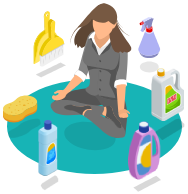
How Cleanliness Can Affect Your Mental Health
Cleaning and decluttering gurus are amassing huge numbers of followers on Instagram and Twitter with several 'cleanfluencers' becoming regular faces on daytime TV.
Organisation 'porn' and cleaning blogs have never been more popular.
Cleaning products suppliers are seeing year-on-year growth in sales thanks in part to the recommendations of social media influencers.
This is a trend that's been around for a couple years but it shows no sign of letting up with Mrs Hinch gaining as many as 100 000 followers on Instragram each month.
Many of these influencers champion the benefits that cleaning can have on mental health but is there anything in this? What is it about clean homes and organised drawers that people find so satisfying?
The psychology behind cleanliness
Keeping your home clean and tidy is good for your physical and mental wellbeing - or so the science says.
A 2010 study by researchers at the University of California used software to analyse how 30 cohabiting couples talked about their homes. Those describing their living spaces as "cluttered" or complained of "unfinished projects" were more likely to be suffering from depression and fatigue than those who described their homes as "restful" and "restorative". It was also found that those living in cluttered environments displayed higher levels of cortisol a hormone that's released into a person's blood from their adrenal gland often in response to stress.
In their 2011 study researchers at Princeton University concluded that a cluttered environment makes it more difficult to focus on a specific task due to a person's visual cortex being overwhelmed by all the task-irrelevant objects in the room.
A 2014 study published in the journal Mindfulness found that participants who took part in 'mindfully' washing the dishes reported a 27% reduction in nervousness along with a 25% improvement in 'mental inspiration'. Mindfully washing the dishes means to do so contemplatively by inhaling the scent of the dishwashing liquid and enjoying the sensation of warm water on your hands.
So it's worth considering how you go about cleaning your home as different approaches may lead to different outcomes. A more energetic clean may be more beneficial to your physical health while a meditative approach could benefit your mental wellbeing.
Cleanliness can be a compulsion
As with most things moderation is key. It's important that your enthusiasm for cleaning doesn't become an obsession and that your fascination with organisation doesn't turn into a crutch that you rely on.
Cleanliness and decluttering can be relaxing and can calm our anxiety. But you can be sure things have gone too far when marks on a kitchen counter or an ornament out of place have the opposite effect. It's also important to consider the amount of time you're spending cleaning and whether it's having a detrimental impact on your relationships or your career.
While your enthusiasm for cleaning can be a perfect distraction something to occupy your mind when you're facing challenges in your life you can't let it take over and it shouldn't be used to obscure problems that may require professional help to address.
It's a positive thing to control your environment and there are many health benefits to living in a clean space but if you feel compelled to control everything within your home there's a chance you could start to lose control over other aspects of your life.
5 ways a clean home can improve your mental health
Cleaning releases endorphins
You can approach cleaning as a meditative task or throw yourself into it all elbow grease and dancing with mops.
We'll talk about the physical benefits of an energetic cleaning blitz later but any form of exercise will result in the release of endorphins. These endorphins go on to interact with the receptors in your brain altering your perception of pain and triggering a positive feeling in your body. Regular exercise has been proven to reduce stress lessen anxiety and ward off depression.
There's also that sense of satisfaction you get from transforming your messy home into a liveable space.

Declutter to improve your focus
The Princeton study we've already mentioned demonstrates that while our brains are perhaps the most complex structures in the universe capable of doing amazing things they're also easily overwhelmed.
If you struggle to focus on office or school work take a look at your work environment. Are you cluttering your visual cortex with objects not related to the task at hand? Piles of paperwork your cereal bowl from breakfast unopened letters an overflowing bin… all these task-irrelevant objects could be making it more difficult for you to focus on what needs to be done. Things like paperwork and unopened letters are particularly troublesome; in addition to their contribution to your cluttered environment they may also act as a visual cue by reminding you of things you've been putting off.
So open those letters and file away any paperwork put the bowl in the dishwasher empty the waste paper bin… if your desk is full of knick-knacks competing with your work for attention perhaps now's the time to decide what to get rid of. If you're not ready to let go quite yet you could always place them in another room.
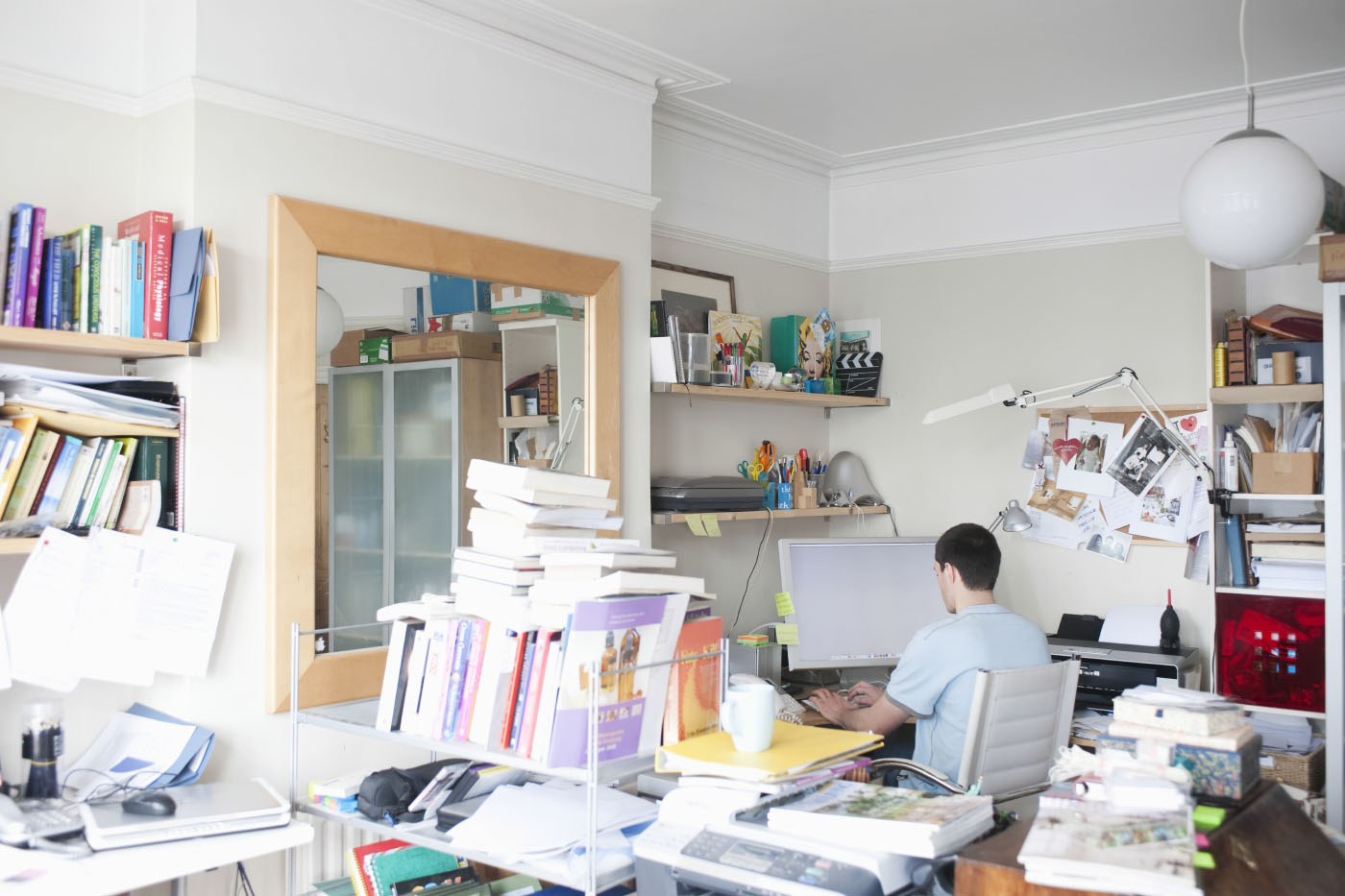
A better smelling home can lift your mood
The link between olfactory sensations and mental health are long-established and it's been proven that aromatherapy can reduce symptoms of anxiety and depression. Because your olfactory response is directly linked to the limbic system (the emotional center of our brain) scents that you associate with past experiences can encourage you to reminisce. But more than that certain scents can have a beneficial impact on your mind and body for example the soothing effect of lavender may help you sleep and would be a perfect scent for the bedroom.
A musty smelling room isn't likely to do anything for your mental health but many cleaning products are scented with citrus " which can have an energising effect and give you a much needed lift.
Other scents you may wish to try in your home include:
- Pine - shinrin-yoku ("taking in the atmosphere of the forest")" " is a form of therapy that originated in Japan. A study has shown the practice to be beneficial in lessening the symptoms of anxiety and depression. Pine scent is common in bathroom cleaning products and disinfectant spray.
- Rosemary and peppermint - both considered to be able to stimulate your mind" " so perhaps best used in the home office or anywhere you need to concentrate.
- Pumpkin - an aphrodisiac" with researchers discovering that 40% of male test subjects responded 'positively' to a pumpkin scent combined with lavender. Perhaps best used in the bedroom?
Sharing a clean environment makes for a better relationship
If you share your living space with others there's always a chance you're not on the same page where tidiness and cleanliness is concerned. Dirty dishes in the sink and hair in the bathtub can cause resentment and be a source of bad feeling which is likely to impact your mental wellbeing.
Try to agree to share responsibility for the housework. Cooperation and compromise can be beneficial to mental wellbeing - as can living in a clean decluttered home free of arguments about who buried the remote control under a pile of dirty clothes.
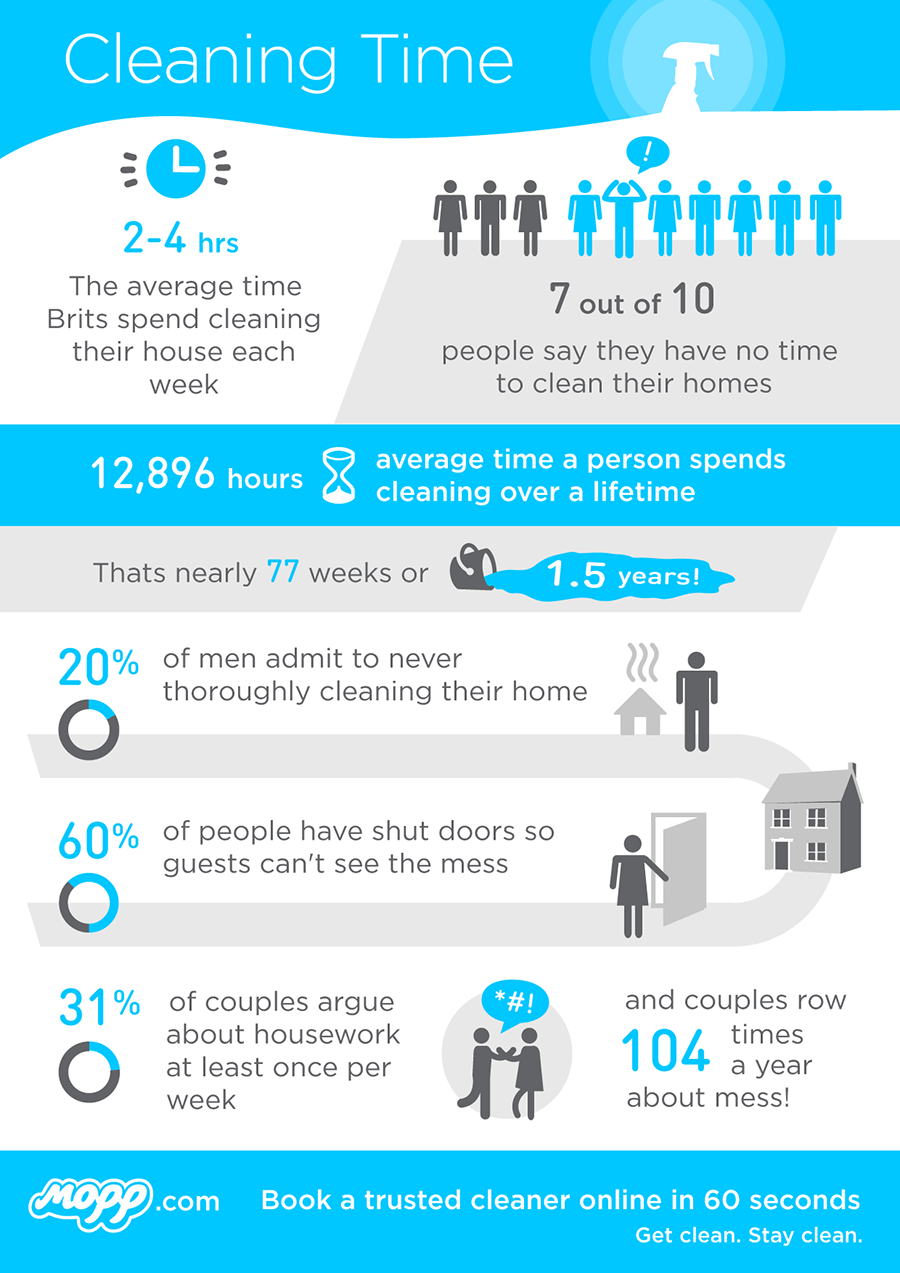
Enjoy better quality sleep
The National Sleep Foundation carried out a survey that found that people who make their beds every morning are 19% more likely to get a good night's sleep. 75% percent said they sleep better when their sheets are freshly laundered and pillows plumped because they feel more comfortable.
It's also true that if your mental wellbeing has been boosted through the general improvement in your home environment that will no doubt have a positive impact on the quality of your sleep.
A clean home for better physical health
We mentioned the release of endorphins you'll experience during energetic housekeeping but if cleaning can be exercise then there are physical benefits to be had too. A 2017 study published in The Lancet concluded that 30 minutes spent blitzing your home could reduce your risk of heart disease by one fifth - as long as the chores require some physical exertion and the session lasts the full half hour. A 30 year old woman weighing 130lbs would burn approximately 130 calories mopping the floor for 30 minutes or 85 doing miscellaneous housework (according to the HealthStatus calculator).
Another obvious benefit to physical health is the removal of bacteria from your home. Household surfaces can be covered in all kinds of potentially harmful bacteria such as E-coli Staphylococcus and Corynebacterium. Common fungal species found in the home include Leptosphaerulina chartarum Epicoccum nigrum and Wallemia sebi. Homes with pets are likely to harbour more diverse species of bacteria and require more frequent cleaning.
If you or others sharing your home suffer from allergies frequent cleaning of carpets and other surfaces can help to reduce symptoms.
A dirty kitchen is a kitchen you're unlikely to enjoy cooking in and so the quality of your meals could suffer. This is likely to impact your diet and physical wellbeing. Ensuring that your kitchen is a clean and tidy environment could encourage you to cook healthier more balanced meals rather than wade past the dirty dishes and discarded pizza boxes to get to the microwave.
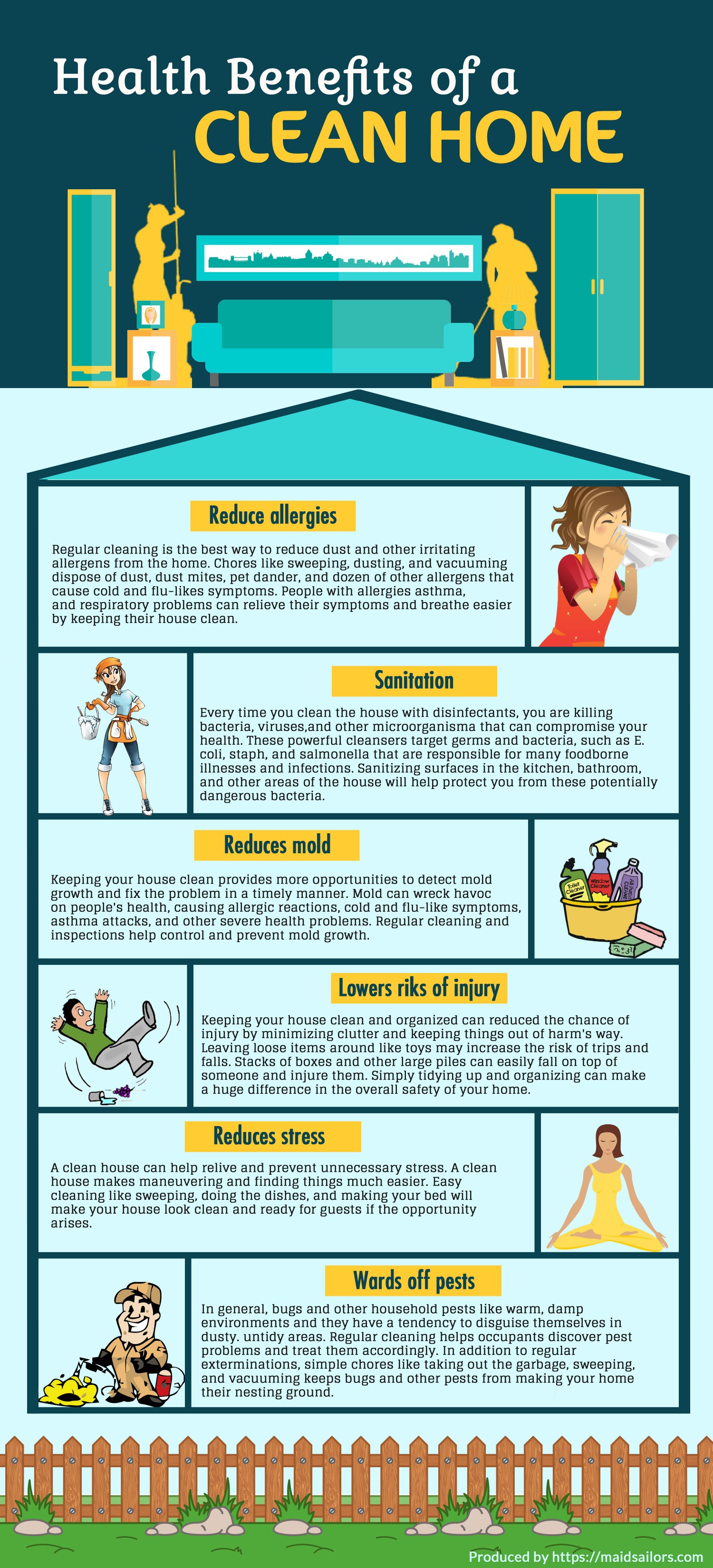
Keeping your home clean and tidy can be difficult
If the mental and physical health benefits of a clean and tidy environment are so obvious why isn't everyone keeping on top of the household chores?
There are many reasons but most people will tell you that they simply don't have time.
Are you daunted by the prospect of decluttering a household full of children's toys or overfaced by piles of paperwork accumulating on the desk in your home office? You're not alone - but if you suspect your living or work environment is impacting your wellbeing it's important to recognise the change in your life that's possible if you put aside half a day to address these challenges.
In a space filled with clutter it can be easy to forget how much easier life can be once you've gotten things organised. If you've grown accustomed to how a messy space looks before long you'll have slipped into certain rituals and routines that reinforce bad habits. However the same applies to good habits as you become accustomed to your freshly decluttered and sparkling clean home.
Tips to keep your home clean - and stay happy
Declutter first clean second
Cleaning is already enough of a chore but cleaning around clutter is even more time consuming and can be extremely frustrating. So it stands to reason that you'd declutter before you get to the dusting.
Use a sorting system such as the three box method. One box for things you intend to keep another for stuff you're throwing out and a third for items you'll be putting into storage. We recommend a fourth box for stuff that's good enough for the charity shop or yard sale. With that in mind make sure you recycle what you can - the less household items ending up in landfill the better.
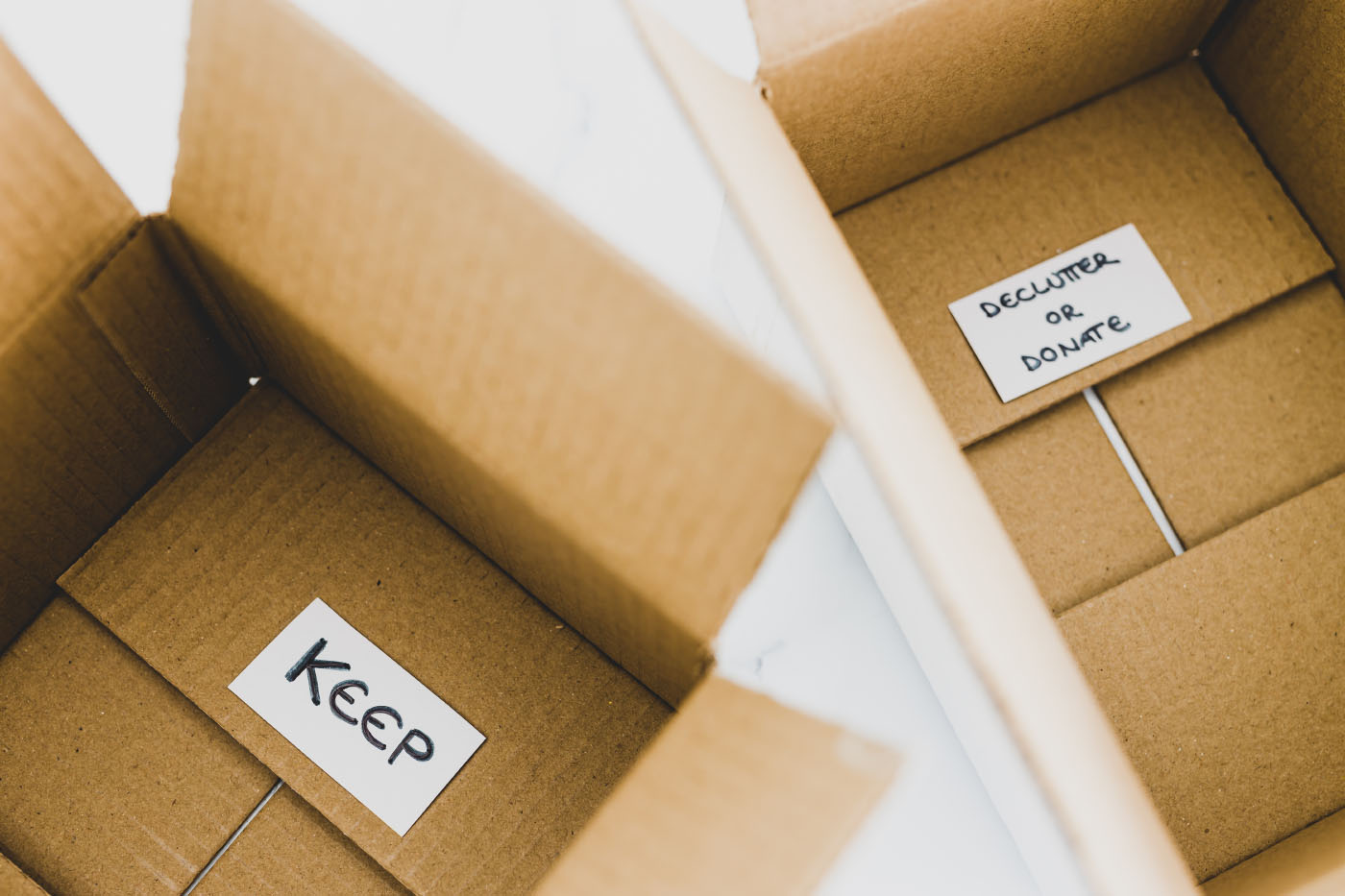
Tackle one room at a time and think hard about what you need to keep. If you haven't used something for a year should it be taking up valuable space in your home? If you'd forgotten you owned something doesn't that imply you no longer need it? Test things to make sure they work. One great way to de-clutter is to discover that half your electronic items are inoperable or obsolete.
Start with the easier rooms to get yourself into the swing of things. As you recognise the benefits you'll feel more confident about tackling the trouble spots.
Set a time limit
This tip is advocated by Mrs Hinch and sees her millions of followers challenging themselves to 'Hinch Half Hours'.
By setting a timer on your phone you're more likely to focus fully on the task at hand and avoid distractions. 30 minutes is plenty and if you prioritise the areas that need urgent attention you'll be surprised by how much you can get through.
Ensure you use the time wisely by getting your cleaning products organised before you start and perhaps write a quick list of what you intend to get done. This will help you avoid spending 10 minutes finding disinfectant spray and you won't be constantly breaking off to decide what to clean next. Be realistic about what you can achieve so that when time's up you won't be disappointed or tempted to continue beyond the time limit.
By incorporating these half hour speed cleans into your daily routine you should find that you're able to keep on top of the housework so you'll have more time to enjoy your home without feeling anxiety about what needs to be done.
Clean top to bottom
Any expert cleaner will tell you that if you're cleaning multiple surfaces in the same room you should start at the top and work down - it's physics! Dislodged dirt and dust will follow the law of gravity and fall onto surfaces below. If you start by vacuuming your carpet or sweeping your kitchen floor you'll only have the repeat the process once you've dusted furniture or wiped debris off your kitchen counters.
The best place to start is at the highest point - deal with the cobwebs on the ceiling and lampshades before tackling dusty picture rails. Move on to shelves furniture and counter tops next then the tops of skirting boards before finally dealing with the floor surface.
Involve the whole family
So no one's suggesting your little ones should be out scrubbing the front steps or sweeping the chimney but there's no harm in getting them involved in tidying up after themselves. It can set a good example for the future and if you make a game of it cleaning can be something they'll enjoy. Instilling tidiness in your kids at a young age won't just help you now but could save years of teenage tantrums about untidy rooms.
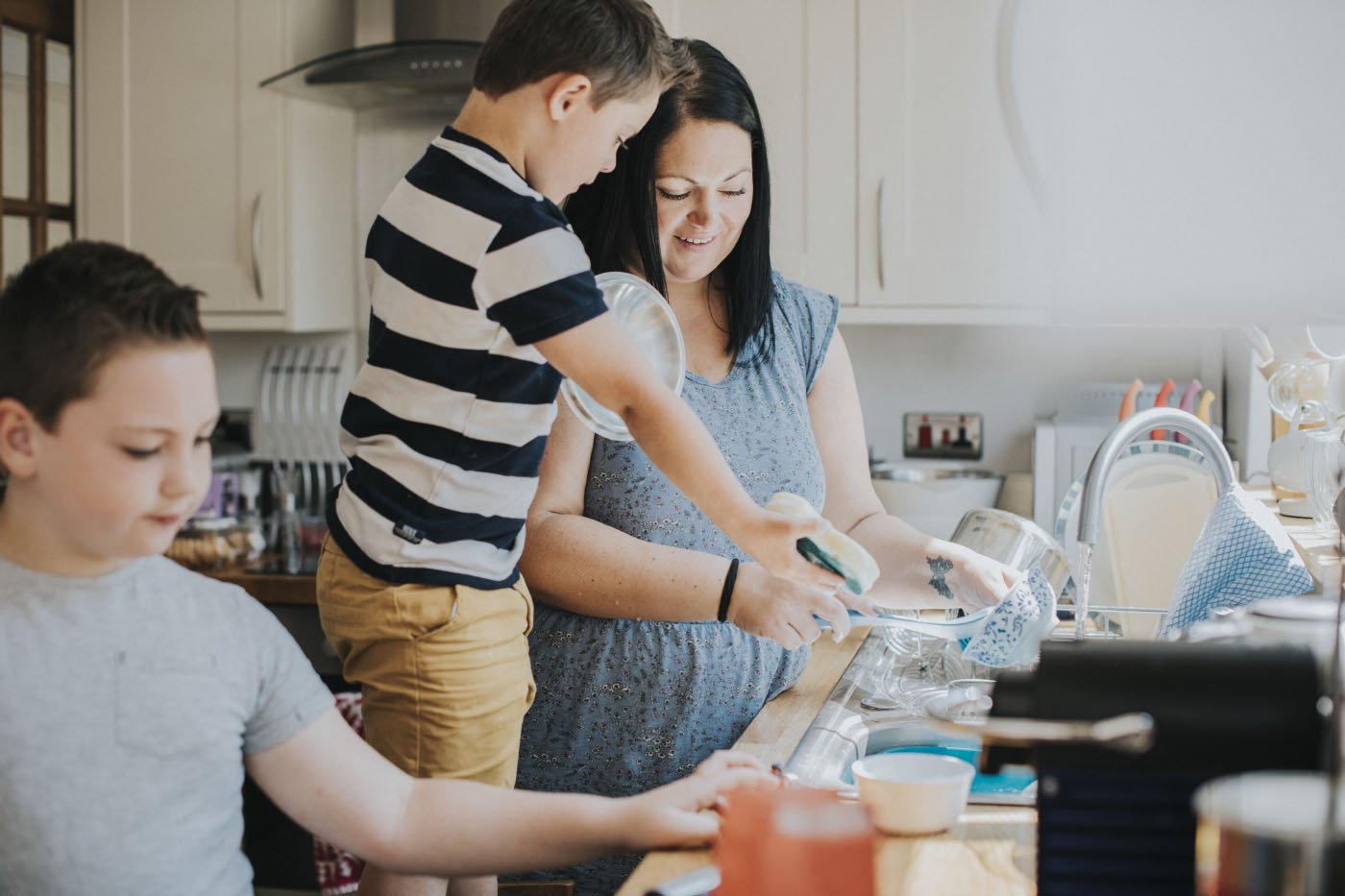
This doesn't just apply to the kids - there's no reason why everyone in the household can't do their bit even if it's just tidying as they go. As we mentioned earlier this sort of arrangement can be beneficial to your mental wellbeing and the quality of your relationships. It's important that when you start cleaning you're not resentful of the mess that people are leaving in their wake.
Get your cleaning products organised
Not content with having you organise your home we're now recommending you organise your cleaning products. One of the most common reasons we're not keeping on top of household tasks is lack of time so it's important to be prepared.
Store everything you need to clean your home in caddies - the expert speed cleaner would have one for downstairs and another for upstairs! If you're able to carry everything around with you in a caddy you can avoid multiple trips back to the kitchen or utility room. You should also carry a bin bag to collect any rubbish as you go.
Anything that won't fit in a caddy should be stored tidily in a cupboard or store room easy to access so you can get started right away instead of spending 10 minutes finding your cleaning accessories.
Dust away the misery
Keeping you home clean and tidy is no mean feat but it could be key to maintaining your mental and physical wellbeing. Decluttering and cleaning promotes a positive mental attitude and can have an energising effect allowing you to focus on other challenges in your life.
Once you've got yourself organised and have been able to establish new routines don't be surprised if you start to feel better about yourself and find that you're more productive at home and at work. Rather than dread picking up a duster you'll begin to enjoy the meditative qualities of housework and appreciate the many benefits of living a clutter free existence.
Stay Connected
Want to hear more from The Cleaning Collective? Sign up to our mailing list for the latest offers and news
Stay Connected
Stay connected and be the first to know about our latest products, special offers, and exciting news:The Cleaning Blog
Want to learn more about cleaning? From the latest cleaning and hygiene news to handy how-to guides, why not check out our most popular blog categories.Stay Connected
Stay connected and be the first to know about our latest products, special offers, and exciting news: